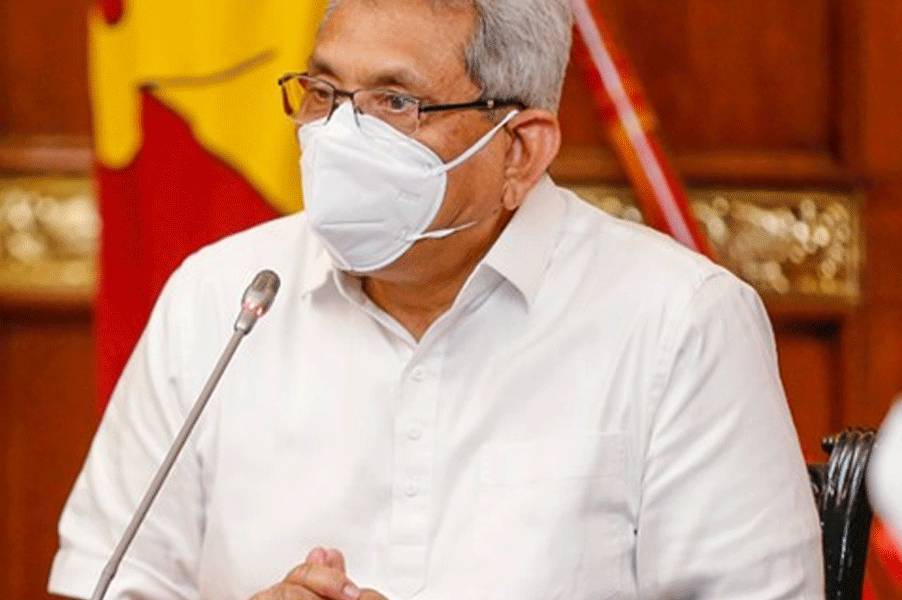President Gotabaya Rajapaksa on Monday expressed hope that more countries would be inspired by Sri Lanka’s bold approach to sustainably transforming its agricultural system to organic agriculture to ensure food security and nutrition for future generations.
The President made these remarks addressing the virtual session of the UN Food System Summit, in Rome, hosted by the Italian Government from 26-28 July.
Leaders from a number of countries are taking part in the three-day summit, which is chaired by UN Secretary-General António Guterres.
The conference will discuss the impact of food systems on achieving the desired sustainable development goals by 2030. Representatives from a wide range of fields, including young people, farmers, indigenous people, civil society activists and researchers, are joining the conference with a new approach.
The right to food is a fundamental human right, the President said, and added that though governments act individually to safeguard this right for their people, they must broaden their understanding of the complexities of the global food system.
In the backdrop of Sri Lanka’s rich agricultural heritage deeply entwined with a long-lasting, ancient and yet highly advanced irrigation system, sustainable organic agriculture is not new to the country and the President said measures would be taken to revitalise historic practices with new scientific advances and management techniques.
He asserted that transformation of the food system was an essential part of the adaptations that governments must execute for the survival of mankind and the planet.
Noting that although mankind was socially, politically and economically diverse, the challenges they faced were universal, President Rajapaksa said, adding that these challenges could not be faced alone and that collective action was needed to overcome them.
The heads of state who addressed the conference focused on food security, mitigation of climate change, strengthening of environmental protection and prevention of biodiversity loss.
Following is the full text of the President’s address to the Food Systems Summit:
“I am delighted to address you at this virtual session of the Pre-Summit of the UN Food System Summit today. The right to food is a fundamental human right. Even as governments act individually to safeguard this right for their people, they must broaden their understanding of the complexities of the global food system. Transforming this system is an essential part of the adaptations we must make to sustain humanity and our planet.
“The ongoing COVID19 pandemic has greatly increased our awareness that we all share one deeply interconnected world. Even though humanity is socially, politically and economically diverse, the key challenges it faces are all universal. These cannot be faced by individual nations alone. They must be addressed collectively if they are to be overcome.
“Decisive, urgent, multilateral action is needed for us to ensure world food security, mitigate climate change, strengthen ecological conservation, combat loss of biodiversity, and ensure that people everywhere can sustainably achieve their aspirations. The challenges ahead are daunting. However, governments must be unwavering in their resolve to overcome them.
“In April of this year, Sri Lanka banned the import of artificial fertilisers, pesticides and weedicides. This decision took into consideration broad ecological concerns as well as clear and present public health concerns. Over the course of many decades, Sri Lanka had become overly dependent on imported artificial fertilisers and agrochemicals for its produce.
“Decades of overuse led to excess fertiliser and agrochemicals contaminating the land and seeping into the groundwater. This worsened environmental degradation, water pollution and caused increased greenhouse gas emissions. It also led to widespread chronic health problems in the country’s farming heartland and contributed to increasing incidence of Non-Communicable Disease amongst the public.
“My Government’s decision to ban imports of artificial fertilisers and agrochemicals was in response to these serious issues. Despite teething problems that must be overcome in the short term, this decision will enable a much-needed national transition to a healthier, more ecologically sound system of organic agriculture in the long run.
“My Government will support our farmers and agribusinesses as this transition takes place. We also greatly welcome the support of the international community in this endeavour. Sri Lanka has a rich agricultural heritage deeply entwined with its ancient hydraulic civilisation that spanned thousands of years.
“Sustainable, organic agriculture is not new to us, but a historic practice we seek to revitalise with new scientific advances and management techniques in collaboration with our partners. We invite multilateral organisations, governments, climate funds, technical bodies and experts, and businesses to help strengthen domestic production capacity of organic fertiliser, farming, and exports through knowledge sharing, technology transfer and investment. Through these improvements, I am confident that Sri Lanka will be able to sustainably transform its food system and ensure greater food security and nutrition for its people.
“Sustainable agriculture, food security and nutrition are key to achieving the UN’s Sustainable Development Goals for 2030. That these goals were unlikely to be achieved on time even before the COVID19 pandemic is a matter of great concern. In this context, the vital work of the Committee on World Food Security in driving global policy convergence on these critical issues is very commendable and must be encouraged.
“In concluding, I hope that Sri Lanka’s example will help inspire more countries to take the bold steps required to sustainably transform the world food system to ensure food security and nutrition for our future generations.”
(FT)

